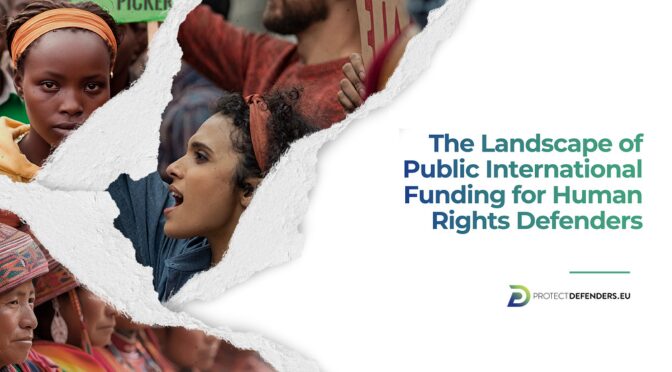
Brussels, 11 June 2024 – In the study “The Landscape of Public International Funding for Human Rights Defenders,” released today, ProtectDefenders.eu sheds light on the critical challenges faced by human rights defenders (HRDs) worldwide, specifically focusing on the financing of HRDs by public actors. The research, which combines an analysis of financial data over a period of four years with interviews, investigations, and input from defenders, underscores the pressing need for greater financial support and resources to safeguard the invaluable work of HRDs in promoting and protecting human rights globally.
The ProtectDefenders.eu study, conducted with the active involvement and consultation of HRDs from diverse regions, provides a nuanced understanding of their funding and operational challenges. It delves into the intricacies of HRD funding, revealing and documenting a concerning trend: while the need for support for HRDs has never been greater, funding levels have stagnated, with only marginal increases observed over the examined period. Despite rhetoric emphasizing the importance of human rights prioritization, the actual allocation of resources has failed to keep pace with the deteriorating global situation, representing a mere 0.11% of total Official Development Assistance (ODA) annually.
Key Findings from the Study Include:
- Disparity in Funding: While some donors have demonstrated a strong commitment to supporting HRDs, others have allocated minimal resources, with wide variations observed among donor contributions. This disparity is also evident among different groups of defenders and thematic areas, as well as in funding dynamics by region, with a concerning decrease in attention to the MENA region.
- Challenges in Accessing Funds: HRDs continue to face obstacles in accessing international funds, including restrictive funding requirements and bureaucratic hurdles.
- Need for Core Funding: There is a critical need for core, flexible, and sustainable funding to enable HRDs to effectively carry out their vital work.
- Lack of Localization Efforts: The study emphasizes the importance of localizing HRD protection programs and ensuring that funding reaches grassroots organizations and movements.
In response to these findings, the study presents a series of detailed recommendations aimed at addressing the funding gap and improving support for HRDs. These recommendations include increasing overall funding levels, reducing restrictions on grants, enhancing political and diplomatic support, and investing in donors’ own capacities to better understand the needs and contexts of HRDs. Therefore, ProtectDefenders.eu calls to all donors and public actors to urgently address this situation. Specifically, the demands include:
- Increase in Public Funding: Advocating for an increase in public funding for HRDs from 0.11% to 0.5% for the period 2025-2028.
- Building Trust Through Core Grants: Urging for more core grants with reduced restrictions, audits, lower result expectations, and extended support horizons.
- Directing More Grants Locally: Advocating for a higher proportion of grants to be allocated to local NGOs to ensure funding reaches grassroots organizations and movements.
- Establishment of HRD Principles for Regranting: Calling upon the community of donors and financiers of HRD work to establish HRD Principles for Regranting, outlining guidelines for more effective and equitable distribution of funds.
“This research underscores the urgent need for action to better support human rights defenders and is a call to action for donors, policymakers, and stakeholders to stand in solidarity with human rights defenders,” said Gerald Staberock, Chair of the Board of ProtectDefenders.eu and Secretary-General of the World Organisation against Torture. “HRDs play a vital role in advancing human rights and democracy worldwide, yet they continue to face increasing risks and challenges. It is imperative that donors and stakeholders heed the recommendations outlined in this study to ensure that HRDs receive the support they need to carry out their crucial work.“
The complete report, along with its recommendations, can be downloaded here and it can be explored on a dedicated webpage on ProtectDefenders.eu website.
For media inquiries or further information, please contact:
Javier Roura Blanco
Secretariat of ProtectDefenders.eu
jroura@protectdefenders.eu


